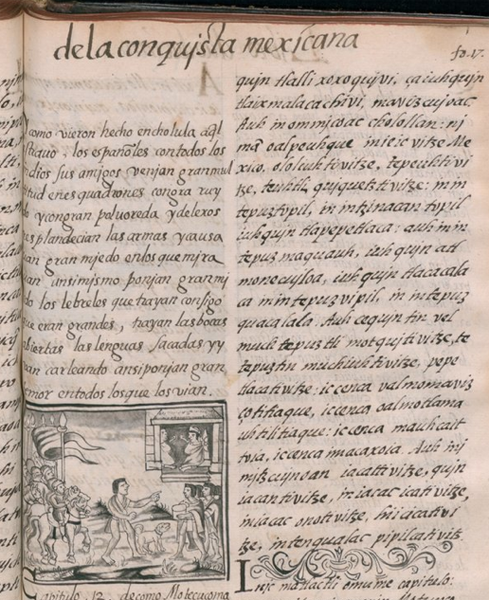Folio 17 recto
Translations and Transcriptions
Spanish Translation
[Translation of the Nahuatl into Spanish by Fr. Bernardino de Sahagún; transcription of the Spanish (left-hand column) by James Lockhart:] [f. 17r.] Y como vieron* hecho en cholula aq̄l estrauo,** los españoles con todos los indios sus amigos venian gran multitud en esquadrones con gra ruydo y con gran poluoreda y de lexos resplandecian las armas y causauan gran miedo en los que mirauan ansimismo ponian gran miedo los lebreles que trayan consigo que eran grandes, trayan las bocas abiertas las lenguas sacadas y yvan carleando ansi ponian gran temor en todos los que os vian. ---------- *COMO VIERON. The second o in "como" serves twice, a second time in what must be read as "ovieren." **ESTRAUO. For "estrago."
English Translation
[Translation of the Nahuatl (right-hand column) by James Lockhart:] as if everything were spinning before one’s eyes. People took fright. And after the dying in Cholula, [the Spaniards] set off on their way to Mexico, coming gathered and bunched, raising dust. Their iron lances and halberds seemed to sparkle, and their iron swords were curved like a stream of water. Their cuirasses and iron helmets seemed to make a clattering sound. Some of them came wearing iron all over, turned into iron beings, gleaming,so that they aroused great fear and were generally seen with fear and dread. Their dogs came in front, coming ahead of them, keeping to the front, panting, with their spittle hanging down. [Translation of the Spanish (left-hand column) by James Lockhart:] After they had wrought that havoc in Cholula, the Spaniards with all their Indian friends came in a great multitude, in squadrons, with much noise and dust, and their weapons gleamed from a distance, arousing great fear in those who were looking. Likewise the greyhounds they brought with them inspired great dread, for they were large, with their mouths open and tongues hanging out, and they went along panting, and thus they inspired great fear in all who saw them.
Analytic Transcription
[Transcription of the Nahuatl (right-hand column) by James Lockhart:] [f. 17r.] quin tlalli xoxoquivi,* ça iuhquin tlaixmalacachivi, mavizcuioac. Auh in ommicoac cholollan: nimā oalpeuhque in ie ic vitze Mexico, ololiuhtivitze, tepeuhtivitze, teuhtli,quiquetztivitze, in intepuztopil, in intzinacantopil iuhquin tlapepetlaca: auh in intepuzmaquauh, iuhquin atl monecuiloa, iuhquin tlacacalaca in intepuzvipil, in intepuzquacalala. Auh cequintin vel much tepuztli mot-quitivitze, tetepuztin muchiuhtivitze, pepetlacaivitze: iccenca valmomavizçotitiaque, ic cenca oalmotlamauh-tilitiaque: ic cenca mauhcaittoia, ic cenca imacaxoia.Auh in imitzcuinoan iacattivitze, quiniacantivitze iniacac icativitze, iniacac onotivitze, hiicicativitze, intenqualac pipilcativitz. ---------- *XOXOQUIVI. I have not found a satisfactory analysis for this word and rely on the analogous preceding phrase.
Image

Spanish Translation
[Translation of the Nahuatl into Spanish by Fr. Bernardino de Sahagún; transcription of the Spanish (left-hand column) by James Lockhart:] [f. 17r.] Y como vieron* hecho en cholula aq̄l estrauo,** los españoles con todos los indios sus amigos venian gran multitud en esquadrones con gra ruydo y con gran poluoreda y de lexos resplandecian las armas y causauan gran miedo en los que mirauan ansimismo ponian gran miedo los lebreles que trayan consigo que eran grandes, trayan las bocas abiertas las lenguas sacadas y yvan carleando ansi ponian gran temor en todos los que os vian. ---------- *COMO VIERON. The second o in "como" serves twice, a second time in what must be read as "ovieren." **ESTRAUO. For "estrago."
English Translation
[Translation of the Nahuatl (right-hand column) by James Lockhart:] as if everything were spinning before one’s eyes. People took fright. And after the dying in Cholula, [the Spaniards] set off on their way to Mexico, coming gathered and bunched, raising dust. Their iron lances and halberds seemed to sparkle, and their iron swords were curved like a stream of water. Their cuirasses and iron helmets seemed to make a clattering sound. Some of them came wearing iron all over, turned into iron beings, gleaming,so that they aroused great fear and were generally seen with fear and dread. Their dogs came in front, coming ahead of them, keeping to the front, panting, with their spittle hanging down. [Translation of the Spanish (left-hand column) by James Lockhart:] After they had wrought that havoc in Cholula, the Spaniards with all their Indian friends came in a great multitude, in squadrons, with much noise and dust, and their weapons gleamed from a distance, arousing great fear in those who were looking. Likewise the greyhounds they brought with them inspired great dread, for they were large, with their mouths open and tongues hanging out, and they went along panting, and thus they inspired great fear in all who saw them.
Analytic Transcription
[Transcription of the Nahuatl (right-hand column) by James Lockhart:] [f. 17r.] quin tlalli xoxoquivi,* ça iuhquin tlaixmalacachivi, mavizcuioac. Auh in ommicoac cholollan: nimā oalpeuhque in ie ic vitze Mexico, ololiuhtivitze, tepeuhtivitze, teuhtli,quiquetztivitze, in intepuztopil, in intzinacantopil iuhquin tlapepetlaca: auh in intepuzmaquauh, iuhquin atl monecuiloa, iuhquin tlacacalaca in intepuzvipil, in intepuzquacalala. Auh cequintin vel much tepuztli mot-quitivitze, tetepuztin muchiuhtivitze, pepetlacaivitze: iccenca valmomavizçotitiaque, ic cenca oalmotlamauh-tilitiaque: ic cenca mauhcaittoia, ic cenca imacaxoia.Auh in imitzcuinoan iacattivitze, quiniacantivitze iniacac icativitze, iniacac onotivitze, hiicicativitze, intenqualac pipilcativitz. ---------- *XOXOQUIVI. I have not found a satisfactory analysis for this word and rely on the analogous preceding phrase.
Image
